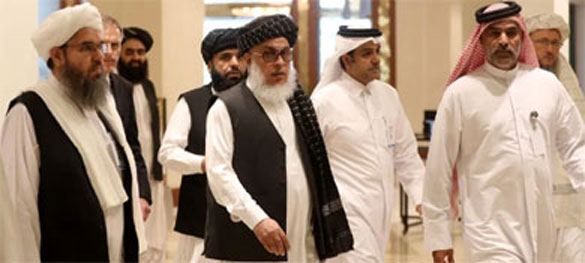The Future of Afghanistan Seems To Be Predicated On a Truce by Trial And Error

By Sajad Abedi
February 24, 2020
The United States this month concluded a so-called truce with the Taliban. Unfortunately, if one bothers to view the actual amorphous details of this “truce,” then it is fairly obvious that the only political consequences it is meant to ensure is to give President Donald Trump the opportunity to keep his pledge to remove American troops from Afghanistan.
 Taliban negotiators attend talks in
Qatar. Photo: Karim Jaafar / AFP
Taliban negotiators attend talks in
Qatar. Photo: Karim Jaafar / AFP
-----
The fact that he wants to do this in 2020, a presidential election year, regardless of whether or not Afghanistan is capable of civilly mending all internal strife and disagreements, shows just how much this instance of international negotiation is more about voters in Ohio, Michigan and Florida than people in Kabul or Kandahar.
But before the various obstacles to real peace are discussed, a few comments that might allow for a small beacon of potentiality are appropriate. The presence of Mullah Abdul Ghani Baradar, one of the core founders of the Taliban, is important in the talks and could help the Taliban make important decisions in negotiations.
Mullah Baradar is a prominent commander who has a background in the former Taliban government. His entry into the US-Taliban talks, which technically began only with the fifth round, could have a major intra-organizational impact in making the Afghanistan peace process more substantive.
Since part of the Taliban’s most important decision-making circle has now come into these talks with the United States, it could result in final decisions that have more teeth than in the past.
Despite repeated calls by the Afghan government to be allowed into these initial negotiations with the Taliban, the group has so far refused to negotiate directly with the government. The US, however, has implicitly insisted that a deal with the Taliban be conditional on a ceasefire and ultimately talks between the Taliban and Afghan government. So while the outcome of the talks without the presence of the Afghan government is unknowable, the small recent success in Doha might have a positive impact on accelerating the peace process and could at least de-escalate internal conflicts with the Taliban.
Unfortunately, this tiny possibility is largely blocked by several significant difficulties, not just with the conditions of this mini-truce but also when examining what comes next when the Taliban actually are meant to sit at the negotiation table across from official representatives of the Afghan government.
First, right off the bat, it should be emphasized how to date, in the context of the Taliban’s political approach, the group has negotiated with various countries, including Russia, China, Saudi Arabia, Iran and the United States. But any real achievement for peace in Afghanistan has usually been dashed because the Taliban have not altered their totalitarian nature and seek absolute supremacy in Afghanistan.
The Taliban disregard not only the official Afghan government but all other ethnic groups in-country, including Hazaras, Uzbeks and Tajiks. So as long as there is no attitudinal change in the Taliban in terms of shared authority across the Afghan governing space, even a real ceasefire is unlikely to produce long-term political success. But this, alas, is no real ceasefire.
Second, logically, the truce declares that hostilities must cease for one week before the next steps can begin. Alas, a true ceasefire was deemed too controversial and too difficult to ensure, thus leaving the truce dead in the water before it even began. So the sides settled on the term “significant violence reduction” instead of “ceasefire.”
How “significant” is defined is unclear, given that the Taliban averaged nearly 75 attacks per day throughout all of 2019. The Taliban, for their part, are magnanimously promising not to attack “major population centers, highways, and government institutions,” but reserve the right to get violent against the formal Afghan government if they suspect it of doing anything they deem inappropriate.
Third, senior Afghan governmental officials have emphasized that successfully toning violence down for one week will not mean very much if this reduction does not hold long-term, as negotiations between Kabul and the Taliban will undoubtedly be protracted, difficult, and tense.
The US, for its part, has actually pushed back against the Afghan government for this “unreasonable” expectation, simply saying that while it will not support the government any more with boots on the ground, it will occasionally lend air support against Taliban positions if they get uppity again and attack the government. Unsurprisingly, the Afghan government is not exactly thrilled with this assurance.
Fourth, it should be pointed out that this initial truce was inexplicably concluded between the United States and Taliban jihadists – that is, it was concluded while excluding any representatives of the formal Afghan government.
Afghan President Ashraf Ghani remains skeptical about the sincerity of the Taliban to honor the long-term point of the truce, which is to make them come to the negotiating table in a civil and amicable manner to engage real long-term negotiations with the government. His acid test of sincerity is about the Taliban’s willingness to agree to the regular holding of open, fair elections, something the Taliban have never agreed to.
So, for those of you keeping score:
A tri-party negotiation about the future of Afghanistan took place with only two parties participating in Qatar. The actual government of Afghanistan was deemed unnecessary.
The truce is not a real ceasefire and technically allows the Taliban opportunity to commit violence, as long as it is less violence than usual and against the “proper” government targets.
The US is using the agreement as a foundational reason to remove troops permanently and physically from Afghanistan, even though the actual agreement lasts only seven days.
The truce is meant to settle peacefully the future political construction of Afghanistan, even though there is no language in it about its territorial integrity or how to hold real elections.
True success likely means very close monitoring and third party oversight of the continued negotiations, something the United States pledges to do only cursorily.
Thus concerning the effects of this US effort on the future of Afghanistan, there seems to be no peace with US troops present and no prospects for peace with US troops removed.
For what it is worth, many local actors in Afghanistan believe the only thing that carries the chance of bringing peace is the withdrawal of foreign forces, especially the United States. To many locals, the Americans de facto brought about Islamic State (ISIS), thereby worsening an already bad domestic situation. They believe the reality is that the Taliban have been the most effective in trying to keep Afghanistan secure from Islamic State, but ISIS’ presence in the country continues to be destabilizing. So as long as US troops are in Afghanistan, ISIS will continue to be a problem.
Also, as long as US troops are in Afghanistan, the Afghan Army will not be powerful because it is de facto dependent on US leadership.
Thus, ironically, there is a significant portion of Afghan society currently agreeing with Trump, even if his actions are completely self-serving for the American electoral cycle: namely, the United States is the cause of insecurity in Afghanistan and if it wants to be independent and at peace, there is no other way than to try a future era without the US actively involved.
As a result, the future of Afghanistan seems to be predicated on a truce by trial and error.
This article was co-written with Dr Matthew Crosston, executive vice-chairman of ModernDiplomacy.eu and senior research fellow at the Institute for National Security Studies.
Original Headline: The tangled US-Taliban-Afghan web
Source: The Asia Times
URL: https://www.newageislam.com/war-terror/the-future-afghanistan-seems-be/d/121142
